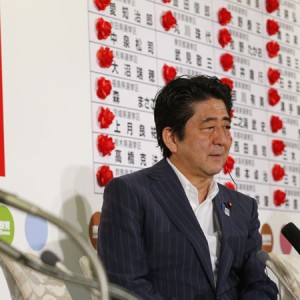Asian stocks mostly gain after Japan election

Japanese Prime Minister Shinzo Abe listens to a reporter’s question in front of red rosettes on the names of his Liberal Democratic Party’s winning candidates during ballot counting for the upper house elections at the party headquarters in Tokyo Sunday, July 21, 2013. Abe’s ruling coalition won a majority in the upper house of Parliament in elections, media projected, giving it control of both chambers and a mandate to press ahead with difficult economic reforms. A sign at left reads: “Liberal Democratic Party.” AP
BEIJING — Chinese stocks fell but other Asian markets edged up Monday after Japan’s ruling party won a majority in parliament’s upper house and a mandate to push ahead economic reforms.
Oil stayed above $108 a barrel amid signs of an improving U.S. economy.
Tokyo’s Nikkei 225 gained 0.1 percent to 14,609.02 following Sunday’s election. The outcome — a victory for Prime Minister Shinzo Abe, whose “Abenomics” program aimed at sparking an economic revival — was widely expected and already had been factored into trading strategies.
“The results of Sunday’s Upper House elections are probably the best outcome for the equity markets, especially if, as seems likely, the yen resumes its gradual decline,” said Marcel Thieliant of Capital Economics in a report.
Markets in Singapore, Seoul, Taipei and Sydney rose in light trading.
Article continues after this advertisementChina and Hong Kong were the regional exceptions. China’s benchmark Shanghai Composite Index was off 0.5 percent at 1,981.34 after sentiment was dampened by last week’s data showing economic growth slowed for a second quarter. Hong Kong’s Hang Seng shed 0.2 percent to 21,326.13.
Article continues after this advertisementThere was little impact from Beijing’s lifting Friday of controls on interest banks can charge on loans.
The move, one element of long-promised financial reforms, could mean lower rates for more creditworthy borrowers and might help to boost growth. But analysts say the immediate impact will be limited because a cap on interest paid on deposits remains in place, suppressing returns to savers and depressing consumer spending.
“Rate liberalization alone will not be able to address all the problems that China faces today,” said Credit Suisse economists Dong Tao and Weishen Deng in a report. “The core issue today is that private investment interest weakened significantly.”
Elsewhere, Taiwan’s Taiex added 0.6 percent to 8,109.16. Sydney’s S&P/ASX 200 rose 0.5 percent to 4,997.30. India’s Sensex added 0.2 percent to 20,192.33. Benchmarks in Manila and New Zealand also rose.
On Friday, U.S. stock prices were hurt by a slump in technology issues including Microsoft, Hewlett-Packard and IBM. The Standard & Poor’s 500 gained 0.2 percent while the Dow Jones Industrial average was almost unchanged.
Japan’s stagnant economy is showing signs of perking up, helped by the aggressive monetary and fiscal stimulus that Abe has implemented since he took office in late December. Stocks have surged, business confidence is improving and the weaker yen has eased pressure on exporters.
Long-term growth requires changes to boost competitiveness and cope with Japan’s rapidly graying population and soaring national debt.
Abe faces a decision this fall on whether to follow through on raising the sales tax next April from 5 percent to 8 percent, a move needed to shore up Japan’s public finances, but one that many worry will derail the recovery.
By contrast, China’s slowdown is deepening, prompting some analysts to say Beijing might need to launch a new stimulus to prevent a plunge in growth.
Economic growth fell to a two-decade low of 7.5 percent in the three months ending in June from 7.7 percent the previous quarter. Retail sales and investment growth also weakened, while surveys showed June manufacturing activity contracted.
New communist leaders who are in their first year in power are trying to shift the basis of China’s growth from exports and investment to more self-sustaining domestic consumption. They say slower growth is acceptable but some analysts warn an accelerating downturn might force them to temporarily reverse course and step up government spending.
In currency markets, the dollar declined to 99.99 yen from the previous trading session’s 100.6 yen. The euro rose to $1.3155 from $1.3141.
Benchmark crude gained 34 cents to $108.21 a barrel in electronic trading on the New York Mercantile Exchange.